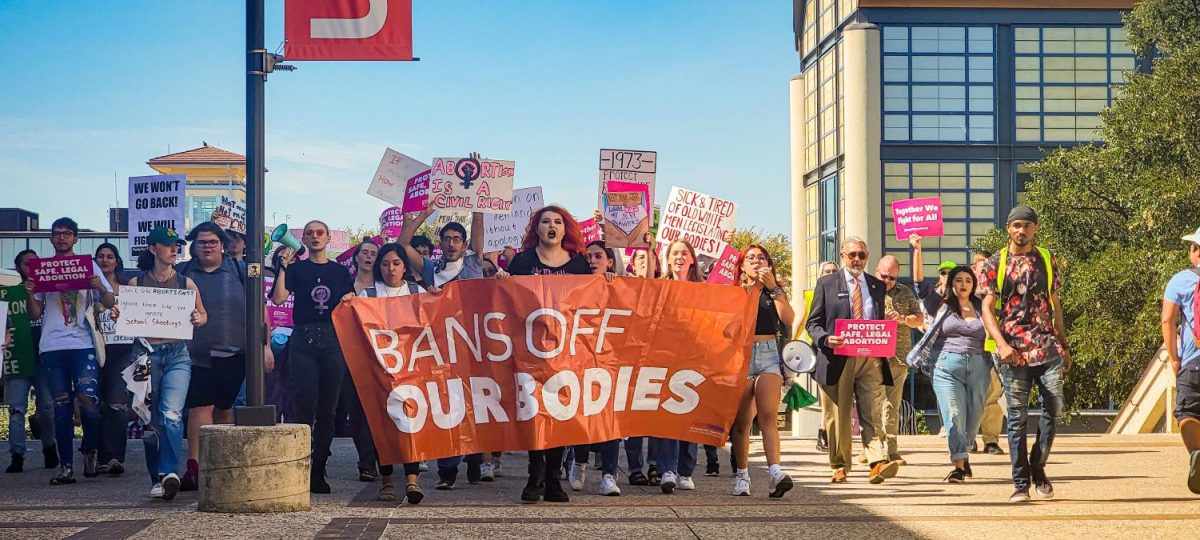The Supreme Court has declined to hear a case that leaves in place a lower court decision that effectively punishes protest organizers with financial consequences if any participant commits an illegal act in Louisiana, Mississippi and Texas. The case in point is Mckesson v. Doe, which questions DeRay Mckesson, leader of a 2016 Black Lives Matter protest in Louisiana.
Previously in the case, the Fifth Circuit held that Mckesson could be liable under a negligence theory for serious injuries sustained by a police officer when an unidentified individual attending the 2016 protest threw a hard object at the officer. Now, after the Supreme Court’s decision, it is unclear how campus advocacy will be impacted.
“I spoke with our chief legal officer and he indicated that this does not have a direct correlation to expressive activities we are likely to see on campus,” Joe Izbrand, UTSA chief communications officer, said in an emailed statement following the Supreme Court’s denial. “Mckesson is about the potential liability of a protest organizer if a protest turns violent. It sounds like this still has a journey to make through the legal process before there is a final outcome to consider.”
In addition to UTSA administration, campus organizations felt it necessary to speak on the situation.
“This decision from The Supreme Court is contemptible but not surprising,” UTSA’s chapter of Young Democratic Socialists of America (YDSA) said. “In hindering the ability to protest peacefully for many constituents in multiple states, they mean to scare us all into inaction. This decision is just one of the many steps that we as a nation have taken on the road to fascism recently.”
The chapter detailed the reasons behind their anger toward the decision and took a stance against previous government decisions.
“Historically, popular movements have never been in the interest of the ruling and wealthy classes and we are witnessing the suppression of free speech and assembly as a result. The Young Democratic Socialists of America at UTSA sees and stands in solidarity with campuses across the U.S. like Columbia University, where peaceful divestment movements result in police arrests and arbitrary academic suspensions; like USC, where 2024 valedictorian Asna Tabassum has been silenced from speaking out about her experiences as a Muslim-American at her own commencement ceremony. Decisions like this happen because oppressive government regimes in the southern states get scared. Because they know our voices en masse are powerful.”
On a broader scope, the Party for Socialism and Liberation (PSL) has many chapters in the U.S. and the San Antonio chapter is no stranger to organizing protests. The San Antonio protest organizers voiced similar thoughts while emphasizing the clickbait surrounding the issue.
“Headlines that say the Supreme Court ‘effectively abolishes’ the right to protest in Texas and other states are pure clickbait,” PSL San Antonio said. “Our right to protest has not been abolished, and we should keep protesting confidently. In actuality, the Supreme Court has only delayed reviewing the constitutional question raised in the important First Amendment case Mckesson v. Doe.”
“The Supreme Court decided not to hear Mckesson v. Doe — yet — and Justice Sonia Sotomayor explained why in a statement. A few days after the Fifth Circuit Court of Appeals made its anti-protest decision on Mckesson, the Supreme Court made a different First Amendment ruling — Counterman v. Colorado. Sotomayor asserts that as Mckesson continues moving through the lower courts, the lower courts are now obliged to give ‘full and fair consideration’ to the higher court’s ruling in Counterman, and she suggests that might lead them to reverse their decision on Mckesson. The implication is that if Mckesson is not reversed at the lower level after considering Counterman, the Supreme Court might then step in.”
With uncertainties surrounding the possible infringement of the First Amendment, people are gearing up for possible political warfare.
“The YDSA at UTSA is not interested in surrendering to half-baked tactics to repress our fundamental American right to free speech and peaceable assembly,” a YDSA spokesperson said. “We believe this Supreme Court decision to be temporary — they will never overturn the First Amendment and so we will continue to be active on campus in whatever political actions our national student communities call us to.”
Similarly, PSL San Antonio is prepared to follow the case and protect their rights as they continue to confidently protest.
“PSL San Antonio believes that Mckesson is an important case which could potentially have significant impact on our First Amendment right to protest. However, headlines that suggest that the right to protest in Texas and elsewhere has been ‘effectively abolished’ is clickbait. We still have the right to protest and we should protest confidently. We urge everyone to try to understand this case, even though the U.S. has a bizarre legal system and uses a ‘legal language’ that is intentionally hard to grasp without training.”
“The PSL will continue to follow the Mckesson case as it moves through the lower courts, with full knowledge that this matter is by no means settled, and that the Supreme Court has yet to hear or rule on any aspect of this case. As we follow the case, the PSL in Texas, Mississippi and Louisiana will continue organizing mass protests, as we have always done, in the great tradition of the Civil Rights and other mass movements for change.”









